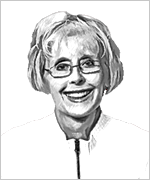


September 24, 2005
Life is a learning experience—the only trouble is you get the tests before you have learned the lessons!
That’s what grandma used to say, anyhow.
She wanted us to be prepared and be responsible. No exceptions. No excuses.
She warned us, “You had better make your bed (in case company comes unexpectedly), wear clean underwear (just in case you are in a wreck), and get your homework done now (you never know the electricity might go out if we get a storm).”
She would say, “Fly right,” and admonish us to be responsible, so that when life’s storms come, and they surely will, you will be just fine.
Makes one wonder though where that character trait is today?
Can personal responsibility still be in found in this crazy world?
Seems to me we hear far too much from sports stars and celebrities who blame someone else for their troubles.
Our young hear their heroes make excuses about bad behavior, and so that is what they think is normal. It’s hard to find a proper role model, but at least we do have Lance Armstrong and a few others who stand tall above the rest.
So, just how do we teach responsibility?
Is it possible for we parents, grandparents, teachers, preachers, scout leaders, mentors, coaches, and anyone with any semblance of authority to teach our nation’s youth to be responsible?
Once, many years ago, I happened upon a person who might have discovered an answer. William D. Leipold, Ph.D., wrote a book about responsibility, among other things. His book, published in 1975 by Independence Press, was entitled “Walk Through the Valley.”
My job was to attend all his lectures, record his speeches, transcribe his weekly classes, and put his thoughts into writing. Until then, none of his ideas had been written down. Dr. Leipold always spoke “off the cuff.”
Today, as I ponder how difficult it must be for young people to grow up in such an irresponsible world, I turn to the words of Dr. Leipold.
Last I heard, Dr. Leipold was retired and living somewhere in Nebraska. Maybe, it is time to look him up and say thank you for these words of wisdom I am about to share with you.
Below, is Dr. Leipold’s simple philosophy about how one can accept responsibility for one’s actions and learn to be a responsible person:
How to Sleep on a Windy Night
“The squire’s handyman had just left him and he had to find another man to work on his farm. He hitched up the buggy and drove to town to find help. He interviewed several people, none of whom were too impressive, but finally chose John because he had to find help that day for the farm. They returned to the farm, and the squire tried to teach John about how he wanted the work done. Before he could show John everything, the squire was called away on business. He was gone three days. On his way home a terrible New England squall came up with high winds and heavy rains. The squire became very fearful that the storm would endanger his cattle, sheep, and, particularly, the winter’s supply of hay. He whipped his horse and hurried home. He arrived at the farm, dashed from the buggy to the house, lit a lantern, and ran to the barn. Lo and behold, the barn was shuttered and the door closed. The squire opened the barn door and there were the cattle munching on the hay that John had given them. The Squire was relieved but then thought of the sheep. He raced around the barn and there found his sheep huddled together safe and sound. Then, he thought of his hay and hurried to the field where the haystacks were all covered and weighted down to protect them from the wind. The squire stood there, cold and wet, becoming quite angry with himself for having been so worried. As he went back to the house, there was lightning and thunder all around him, so he hurriedly entered through the back door. John’s bedroom door was partly open, so the squire looked in. John was sleeping soundly, snoring to high heaven. The squire thought, John has taught me a lesson I hope I never forget. He has taught me how to sleep on a windy night!”
Dr. Leipold said that the moral of this story was simple, “John could sleep because he was at peace with himself. He had accomplished all his tasks in a responsible manner, and thus, could sleep through the storm.”
My grandmother, like Dr. Leipold, believed in being responsible. After all, she knew that if you find a road with no obstacles, you’ll probably find that road does not lead anywhere. Therefore, you had better be prepared for the road with obstacles.
I say, that’s just another reason to have a roadmap in your glove box!

